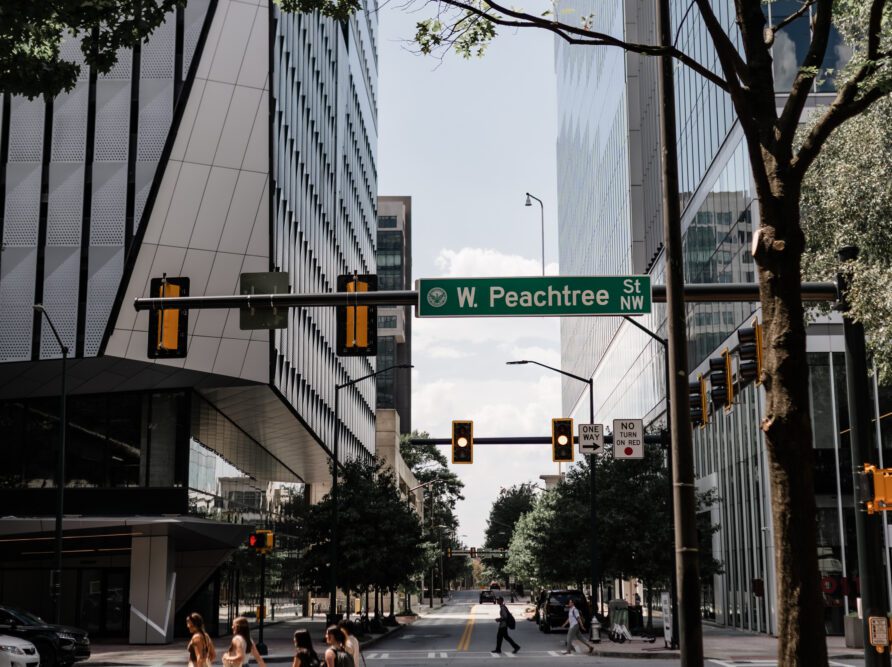Picking a place to live near Georgia Tech can be a long and confusing process. Location, amenities and cost are just a few of the many important factors to consider when making your decision.
Read Next: Benefits of Signing an Individual Lease at an Off-Campus Apartment
At Rambler Atlanta, we understand how hard it can be to evaluate your options and know what information to consider. To help you along in your student housing search, we made this list of essential questions to ask when touring an off-campus apartment.
What to Ask Before Signing a Lease at an Off-Campus Student Apartment at Georgia Tech

1. What are the precise lease conditions?
Reviewing a lengthy lease agreement filled with complex jargon can feel daunting. To gain clarity and direct information, ask about specific lease terms during your tour. Key details to ask about may include:
- What are the move-in and move-out dates?
- What is the policy regarding subletting?
- Are there limitations on installing fixtures like shelves or hanging photos?
- Are there any additional expenses?
- What is the policy for late fees?
- Is on-site parking provided?
Read Next: How to Sign a Lease
2. What is covered by my monthly rental fee?
Understanding the components included in your monthly rental fee is essential for determining any potential additional expenses. Consider the following items:
- Utilities: Typically billed separately, though occasionally bundled into the monthly rate.
- Water: Often incorporated into the monthly fee, but occasionally charged as an extra.
- Wi-Fi: Many student residences include Wi-Fi expenses in their monthly rates; verify whether it’s included or incurs an additional charge.
- Cable: Certain student housing options in Midtown may incorporate cable costs into the monthly rent.
- Trash: Trash removal is commonly covered in student apartment rentals, though it might entail an extra fee.
3. What are the expenses for utilities?

The inclusion or exclusion of utilities in your rental agreement can significantly impact your overall off-campus living expenses.
Ask about the types of utilities covered by the rental agreement and those that are not. Additionally, ask what the average monthly utility cost is for a typical resident to gain a clearer picture of the total monthly expenditure. If the leasing office does not have utility cost estimates, you can also reach out to local utility providers for an approximation.
Read Next: 10 Additional Costs to Consider When Looking at Off Campus Apartments
4. What are the guidelines regarding pets?
If you want to bring your furry friend with you to your apartment, make sure you ask about the property’s pet policy.
Ask whether or not pets are permitted at all, and if so, what associated fees and regulations there are concerning size and breed. Typically, you’ll be charged a non-refundable pet deposit, monthly pet rent or a combination of both.
5. How is subleasing managed?
During the summer break, many Georgia Tech students go on study abroad programs, work internships in different cities or return home for the break.
If you anticipate an extended leave from your Midtown apartment and are considering subletting your space to another student during this period, it’s important to get the details on the property’s subletting policy.
While the specifics are typically outlined in your lease agreement, it’s important to directly ask the landlord for further clarification on the policies. Subletting without proper permission or failing to adhere to the lease terms can potentially result in legal ramifications.
6. Is renter’s insurance mandatory?

Renter’s insurance offers protection against unforeseen circumstances such as fires, floods, theft and more. Certain policies may even extend coverage to injuries sustained within your apartment. However, the requirement for renter’s insurance varies depending on the chosen apartment complex.
It’s crucial to ask about the specific policy of each apartment regarding renter’s insurance. While some places mandate all tenants have renter’s insurance, others may provide their own policy at a nominal fee, so understanding the insurance requirements of each apartment is essential.
Read next: Student Guide to Renter’s Insurance
7. What are the rent payment procedures?
Avoiding late fees is a priority for everyone. To ensure a smooth payment process, ask about the due date for rent and the accepted payment methods.
Common payment options include auto-pay, online manual payments and traditional check payments. Opting for auto-pay is a good option for anyone like me who’s prone to forgetfulness, as it saves time, prevents late fees and provides assurance that rent will be paid on time. Regardless of your choice, it’s important to understand the payment procedures offered by your apartment complex.
8. What are the repercussions if I need to terminate my lease early?

Although breaking a lease is never anyone’s plan, unforeseen circumstances may arise that require you to terminate your lease. It’s crucial to understand the protocol in the event that you need to terminate your lease prematurely.
Depending on the apartment’s policy, early termination could incur substantial fees. If you’re uncertain about committing to a year-long lease, familiarize yourself with the penalties for terminating the contract before signing.
9. How are maintenance issues addressed?
Prompt and efficient maintenance services are vital for an uninterrupted living experience. Ask about the availability of maintenance, emergency repair procedures and the typical response time.
10. What security measures are in place?
Feeling secure in your new residence is important. During the tour, ask about the property’s security features. Ask detailed questions regarding external security measures, such as the presence of a buzzer system, the requirement for a key fob for entry and the availability of 24/7 security.
If there’s a parking garage, ask about safety protocols for walking from the garage to the building after parking.
Regarding your individual apartment, ask if there are deadbolts on the front door and whether each bedroom is equipped with an individual lock.
11. How frequently does rent typically increase, and by what percentage?
Even if not explicitly stated in your lease agreement, rental rates may undergo periodic increases when you renew your lease annually. If you plan on extending your lease beyond the initial lease term, it’s good to ask about the frequency and magnitude of potential rent increases to prepare for future living costs.
12. Is parking provided, and what are the associated fees?
Given the limited parking options in Atlanta, most student apartments in the Midtown area offer on-site parking garages. Availability is typically on a first-come, first-served basis, with an additional monthly fee. To include parking expenses in your budget, ask about the monthly cost of a parking pass.
Read next: Ultimate Guide to Parking Near Georgia Tech
13. Do you offer roommate matching services?

Finding compatible roommates is essential for having a good living experience. Many student apartments provide roommate matching programs based on a brief questionnaire. If you’re interested in such a service, ask whether the apartment complex offers roommate matching assistance.
Read next: How does roommate matching work at Rambler?
14. What fees are due upon application, lease signing, and move-in?
To avoid any unforeseen expenses on move-in day or lease signing, ask about potential upfront fees. Common charges include:
- Application Fee: A typically non-refundable charge covering application processing costs, including background checks and guarantor screening.
- Administrative Fee: A one-time, non-refundable fee paid upon lease signing, covering administrative services such as billing and auditing.
- Security Deposit: A refundable deposit returned at the end of your lease if no significant damages beyond normal wear are present.
15. Is a guarantor or co-signer required?
For many students, particularly those with part-time or no employment, a guarantor is often necessary to secure a lease. A guarantor, typically a parent or guardian, assumes responsibility for any missed payments. It’s important to get clear information on whether or not you’ll need a guarantor so you can plan ahead.
We hope this list prepares you so you can check all the boxes on your next student apartment tour. If you’re ready to sign, be sure to check out our article on how to sign a lease, so you know all the important steps involved in securing your housing. If you’re ready to lease at Rambler or would like to take a tour, reach out to our leasing office! We are happy to help!




